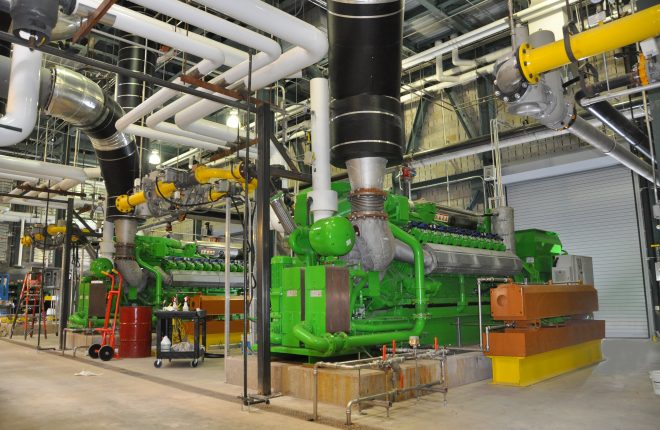At the Office of Sustainability, we envision a future in which all Philadelphians efficiently use clean energy that they can afford. How will we get there? Clean energy is usually talked about as solar and wind projects, but there are many different ways to generate energy without burning fossil fuels. One example is biogas cogeneration.
What is biogas cogeneration you ask?
Biogas is a type of fuel that is produced by the decomposition of organic matter. Organic matter is the stuff we flush down the toilet or put down the garbage disposal each day. When that waste and water goes down the pipes, it must be processed in a sewage treatment facility. All that stinky sewage produces biogas, which is made up largely of methane.
Cogeneration, also known as combined heat and power, is when you create useful heat and electricity through the same process.
Biogas cogeneration uses treated biogas produced from sewage to create electricity we can use to power our lights and heat we can use to stay warm in the winter. It’s more efficient than regular energy generation because it recovers otherwise wasted thermal energy for heat. Pretty cool, right?
Biogas Cogeneration in Philadelphia
Philadelphia opened its first biogas cogeneration plant in 2013 at the Northeast Water Pollution Control Plant. A project of the Philadelphia Water Department (PWD) and Ameresco, Inc, the facility creates more than 34 million kWh of energy annually. That’s the equivalent of adding more than 5,800 solar installations to residential rooftops. It also reduces Philadelphia’s carbon footprint, an important factor in lessening the impacts of climate change.
The biogas cogeneration project was designed for on-site use and can produce up to 85% of all the electricity used for the plant’s operations. The project supports PWD’s Utility-Wide Strategic Energy Plan and serves as a success story for other City departments and the City of Philadelphia’s energy goals. As we strive to reduce our carbon emissions 80% by 2050, the City is investigating projects that integrate on-site and off-site renewable energy production where feasible. The forthcoming Municipal Energy Master Plan will outline further opportunities to invest in renewable energy on City-owned property.
The Municipal Energy Master Plan will be released later this year. To keep up to date, join our newsletter by emailing us at sustainability@phila.gov or follow us on Facebook, Twitter, or Instagram to receive updates.

